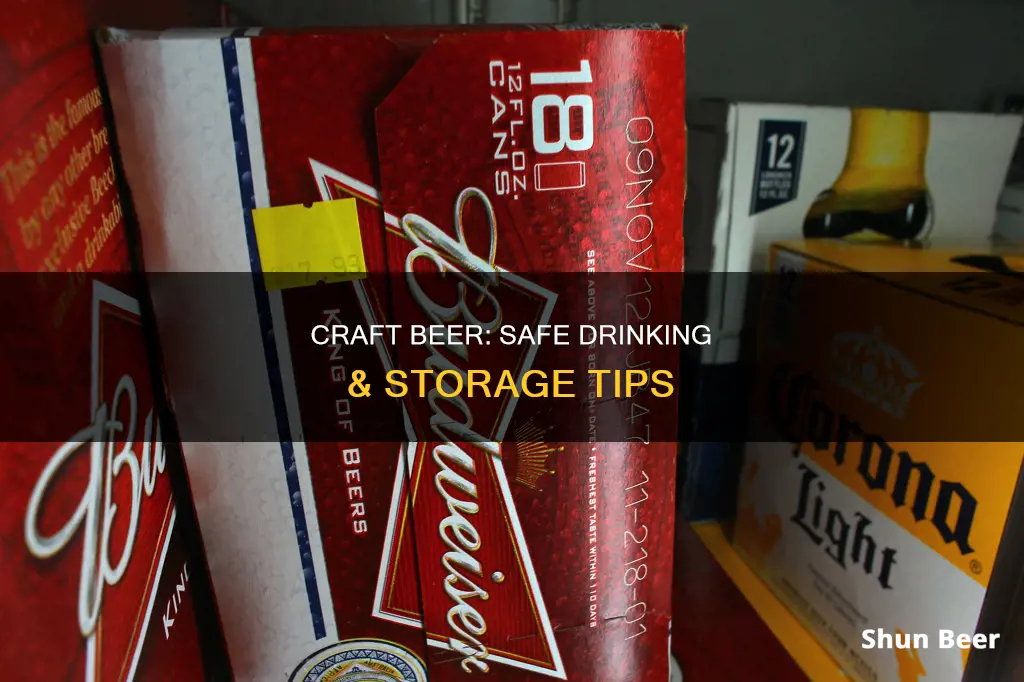
Craft beer does not expire, but its flavour can deteriorate over time. The style of beer, how it is packaged, and the temperature it is stored at will all impact how the beer's flavour changes over time. Light body, low ABV beers tend to have their flavour deteriorate faster than darker, high ABV beer. Canned beer will do much better over extended periods than bottles. Beer bottles can be dark brown, green or clear. The darker the colour, the better it is at preventing UV light from reaching the beer and skunking it. But even dark bottles still let some UV light to get to the beer.
| Characteristics | Values |
|---|---|
| Is craft beer safe to drink? | Yes, craft beer is safe to drink. |
| Is craft beer safe to drink if it is old? | Yes, old craft beer is safe to drink. |
What You'll Learn
- Is my craft beer safe to drink if it's old?
- Is my craft beer safe to drink if it's been stored in a mini-fridge?
- Is my craft beer safe to drink if it's been exposed to light?
- Is my craft beer safe to drink if it's been exposed to oxygen?
- Is my craft beer safe to drink if it's been exposed to fluctuating temperatures?

Is my craft beer safe to drink if it's old?
It's important to note that beer doesn't expire in the same way that spoiled food does. The alcohol content and hops in beer, which have antimicrobial characteristics, prevent pathogenic bacterial growth. Therefore, even if a beer is consumed years after its "best before" date, it is unlikely to pose any health risks. However, the taste of the beer will likely have deteriorated, and it may lose its carbonation.
The fermentation process used in brewing, along with its low pH level and alcohol content, make beer an unfriendly environment for microorganisms. As long as the beer remains sealed, preventing bacteria from entering, it is safe for consumption, even after its expiration date. However, once a beer is opened, oxidation occurs, and the beer will gradually lose its flavour.
The shelf life of beer varies depending on the type of beer and its packaging. Beers with higher alcohol content, typically above 9%, tend to have a longer shelf life. Canned beers also have a longer shelf life compared to bottled beers since they prevent light and oxygen from interacting with the beer. Bottled beers, especially those in clear or green glass, are more susceptible to UV light, which can cause a chemical reaction resulting in an unpleasant skunky taste.
To ensure the best taste and quality, it is recommended to consume craft beer within four months of its bottling or canning date. Storing craft beer in a cool, dark place, preferably a refrigerator, can help maintain its freshness and slow down the ageing process.
Beer and Naproxen: Is It Safe to Mix?
You may want to see also

Is my craft beer safe to drink if it's been stored in a mini-fridge?
It is safe to drink craft beer that has been stored in a mini-fridge. In fact, it is recommended to store beer in a cool, dark place to prevent it from spoiling. Beer is best preserved when kept cold, as it slows down the aging process and prevents the beer from spoiling due to heat and light exposure.
Temperature does affect beer, but it is not temperature cycling that destroys it. Beer can be cooled, warmed, and then cooled again with minimal to no changes in taste. However, a quick temperature change from cool to warm is worse for beer than a slow one. Beer stored at room temperature can have its shelf life reduced from nearly six months to only a few weeks, and exposing it to very warm temperatures can affect its flavour in a matter of days.
It is important to note that beer should be stored upright, as storing bottled beer on its side can make it prone to air leaks. Additionally, keeping beer in clear bottles is not recommended, as light exposure can cause it to turn "skunky".
To ensure the best quality, craft beer should be consumed within 30-45 days of purchase.
Drinking Beer in Autzen Stadium: What's Allowed?
You may want to see also

Is my craft beer safe to drink if it's been exposed to light?
It is not advisable to drink craft beer that has been exposed to light. Light exposure can cause the beer to become "light-struck", which is an irreversible process.
Light-struck beer has undergone a chemical reaction wherein ultraviolet rays interact with hop compounds to produce 3-methyl-2-butene-1-thiol (3-MBT), the same chemical that skunks emit as a defensive spray. This process can occur within a few seconds to a few minutes of exposure to direct sunlight, and within hours if the beer is stored in indirect light.
The result is a strong, unpleasant skunky smell and taste, which can render the beer undrinkable.
To avoid light-struck beer, it is recommended to store beer in opaque containers such as kegs, cans, ceramic bottles, or stainless steel bottles/containers. If glass bottles are used, brown glass is the best option as it blocks light below 500nm, whereas green glass bottles block only 20% of ultraviolet rays, and transparent glass offers almost no protection.
Additionally, it is advised to keep beer away from direct sunlight and artificial light sources such as LED and fluorescent lights, as these can also cause skunking.
Beer Drinking: Daily Habit to Alcoholism?
You may want to see also

Is my craft beer safe to drink if it's been exposed to oxygen?
Oxygen is the enemy of good craft beer. It can spoil the long-term stability of your beer's flavour and clarity and lead to a variety of off-flavours. Oxidation can happen anywhere in the brewing process, from the brewhouse to the fermentation cellar, to the packaging line, and even within the bottle in storage after packaging.
Oxygen is needed to allow healthy yeast growth during fermentation, but once the yeast has started fermentation, oxygen is considered a contaminant. The longer your beer's lifespan, the more important it is to manage the amount of oxygen in the beer-making process.
The Beer Judge Certification Program (BJCP) describes oxidised beer as having "any one or a combination of stale, winy/vinous, cardboard, papery, or sherry-like aromas and flavours". Oxidation can also cause a haze in the beer as the oxygen interacts with polyphenols and tannins.
If your craft beer has been exposed to oxygen, it will likely be safe to drink, but it may have developed some of the stale, off-flavours described above. The rate of oxidation increases with rising temperatures, so if your exposed beer has been stored in a cool place, it may not have oxidised as quickly.
To avoid oxidation in the future, there are several strategies you can employ:
- Minimise splashing when transferring beer from one vessel to another.
- Use proper oxygen barrier containers, such as glass or metal, for fermentation or long-term storage.
- Keep headspace to a minimum when bottling and use oxygen-absorbing bottle caps if possible.
- Minimise exposure to air during bottling or kegging and do a good purge with CO2.
Beer and Augmentin: Safe Mix?
You may want to see also

Is my craft beer safe to drink if it's been exposed to fluctuating temperatures?
Fluctuating temperatures will not make your craft beer unsafe to drink. In fact, it is a myth that temperature cycling negatively affects beer freshness. Beer is best preserved when kept cold, and exposing beer to very warm temperatures can affect its flavour in a matter of a few days. However, it will not make you sick.
The ideal temperature for storing beer is at, or slightly above, the temperature that you would look to serve the beer. For strong beers (Barley Wines, Tripels, Dark Ales, Imperial Stouts), this is around 12-16°C; for standard ales (Pale Ales, IPAs, Lambics, Stouts), 10-12°C; and for lighter beers (Lagers, Pilsners, Wheat beers), 7-10°C. Essentially, the lower the alcohol, the cooler it should be stored.
It is worth noting that, while refrigeration can be ideal for some beers, for certain styles it should be avoided. For wild/sour ales containing live yeast, refrigeration will stop the beer from evolving over time. Similarly, for beers where the characteristics will change and improve over time, such as Imperial Stouts and Barley Wines, refrigeration will slow this development.
Additionally, if the beer is unpasteurised and not bottle-conditioned, it should be kept refrigerated at all times where possible. In this case, the beer has nothing to "preserve" or extend its shelf life, so it will deteriorate more quickly due to oxidation if not kept cold.
Drinking Beer and Losing Weight: Is It Possible?
You may want to see also
Frequently asked questions
Yes, your craft beer is safe to drink. Even if it's old, it won't make you sick or harm you in any way. However, it might not taste as good as it did when it was fresh.
If your home-brewed beer goes bad, you can taste it. Even then, it won't make you sick. It will just taste bad. All the warnings about maintaining good sanitation are just to keep your beer tasting good, not to prevent disease.
Yes, old beer is safe to drink. However, it probably won't taste as good as it did when it was fresh.







